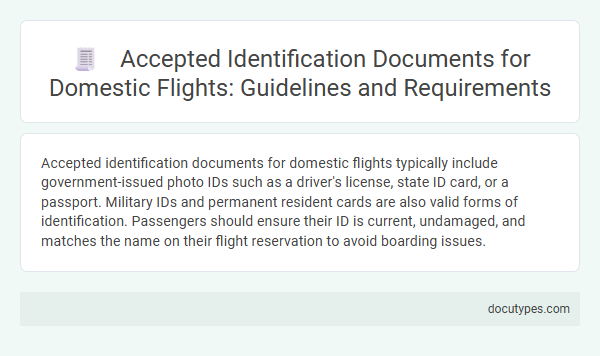Accepted identification documents for domestic flights typically include government-issued photo IDs such as a driver's license, state ID card, or a passport. Military IDs and permanent resident cards are also valid forms of identification. Passengers should ensure their ID is current, undamaged, and matches the name on their flight reservation to avoid boarding issues.
Introduction to Domestic Flight Identification Requirements
Identification requirements for domestic flights ensure safe and efficient travel within the country. Knowing what documents are accepted helps you prepare for a smooth airport experience.
- Government-Issued Photo ID - A valid driver's license or state ID card is commonly accepted for domestic air travel.
- Passport - U.S. or foreign passports serve as reliable proof of identity for domestic flights.
- Real ID Compliance - Starting May 7, 2025, travelers must present a Real ID-compliant document or an acceptable alternative for TSA checkpoint screening.
Overview of Accepted Identification Documents
Airlines and security agencies require valid identification documents for passengers on domestic flights to verify identity and enhance security. Accepted IDs must be government-issued and include specific features to meet regulatory standards.
- State-issued driver's licenses - These are commonly accepted and must be compliant with the REAL ID Act requirements after the deadline.
- U.S. passports and passport cards - Valid passports provide a universally accepted form of identification for domestic travel.
- Military identification cards - Active duty and retired military personnel may use these IDs for domestic flight security verification.
Government-Issued Photo IDs: Primary Options
What identification documents are accepted for domestic flights? The primary options include government-issued photo IDs that verify your identity and citizenship. These documents ensure smooth security checks and boarding processes.
Real ID Act Compliance for Air Travel
For domestic flights within the United States, the Transportation Security Administration (TSA) requires travelers to present identification documents that comply with the Real ID Act. Acceptable forms of ID include state-issued driver's licenses and identification cards that meet Real ID standards, as well as other federally accepted documents such as passports and military IDs.
The Real ID Act establishes minimum security features for state-issued IDs to enhance air travel security. Starting May 7, 2025, every passenger must present a Real ID-compliant document or an alternative TSA-accepted ID to board a domestic flight. Identification documents like U.S. passports, passport cards, DHS trusted traveler cards, and U.S. military IDs remain valid for air travel without Real ID compliance requirements.
Alternative Identification Documents for Special Cases
Identification documents are essential for domestic flights to confirm your identity and ensure security. Standard IDs may not always be available, so alternative identification documents are accepted in special cases.
- Expired Driver's License - Accepted if issued within the past 12 months and not expired due to revocation or suspension.
- Military ID - Valid for active duty, reserve, and retired military personnel as an official form of identification.
- Trusted Traveler Cards - Includes Global Entry, NEXUS, and SENTRI cards accepted as secure identification at airport checkpoints.
Presenting any recognized alternative ID must meet TSA requirements to verify your identity before boarding.
Identification Guidelines for Minors on Domestic Flights
Domestic flights require specific identification documents to verify the passenger's identity. Accepted forms typically include government-issued IDs such as a driver's license or passport.
Minors under 18 often do not need to show identification when traveling with an adult on domestic flights. However, airlines may require proof of age or relationship, such as a birth certificate or adoption papers, to comply with identification guidelines for minors.
Lost or Expired ID: What Travelers Should Know
Domestic flights require valid identification such as a driver's license, state ID card, or a U.S. passport. Travelers who have lost their ID or possess an expired one should contact the airline and the Transportation Security Administration (TSA) before arriving at the airport. TSA may allow alternative verification methods, but arriving early is crucial to complete additional screening processes.
TSA Screening Procedures for Identity Verification
For domestic flights within the United States, the TSA accepts several forms of identification to verify a traveler's identity. Commonly accepted documents include state-issued driver's licenses, state ID cards, U.S. passports, and military IDs.
TSA screening procedures require passengers to present valid ID matching their boarding pass information. Additional verification steps may be conducted if the initial ID does not meet TSA standards or if the traveler is unable to produce acceptable identification.
Frequently Asked Questions About ID for Domestic Flights
Accepted identification documents for domestic flights typically include a government-issued photo ID such as a driver's license, state ID card, or military ID. Passengers may also use a U.S. passport or passport card as valid identification during airport security checks. It is important to verify that your ID is current and meets TSA requirements before travel.
Many airline and security officials often receive questions about acceptable forms of ID and their validity for domestic air travel. Identification documents without a photo or expired IDs are generally not accepted by Transportation Security Administration (TSA) agents. Families traveling with children under 18 usually do not need to provide identification for minors unless requested by the airline.
Travelers sometimes ask if digital or mobile driver's licenses are allowed for boarding domestic flights. Currently, TSA accepts physical ID cards, but pilot programs for mobile IDs in select states are expanding. The Department of Homeland Security and TSA regularly update guidelines on ID acceptance, so checking the latest requirements before your trip ensures a smooth security experience.
What Identification Documents Are Accepted for Domestic Flights? Infographic

